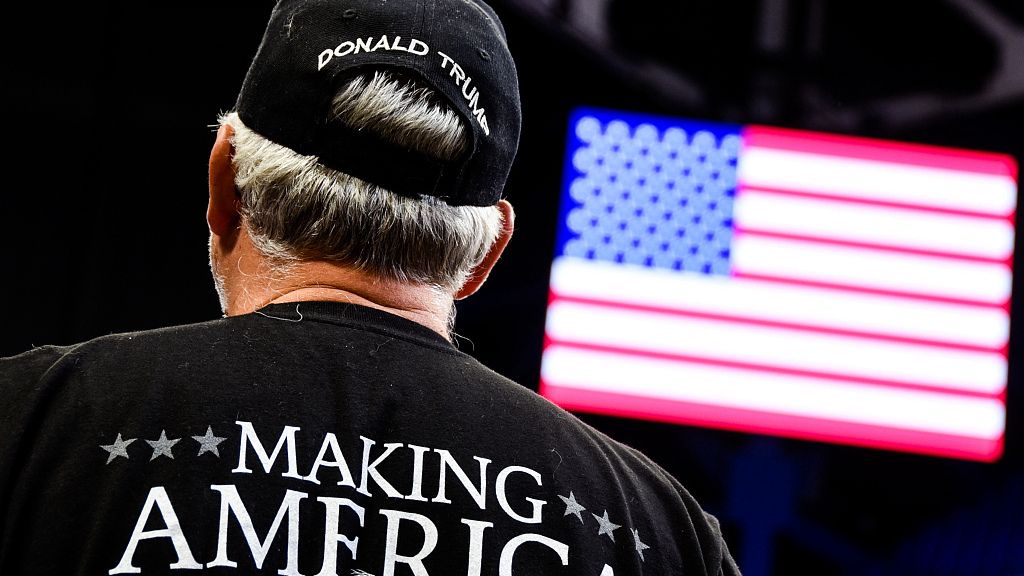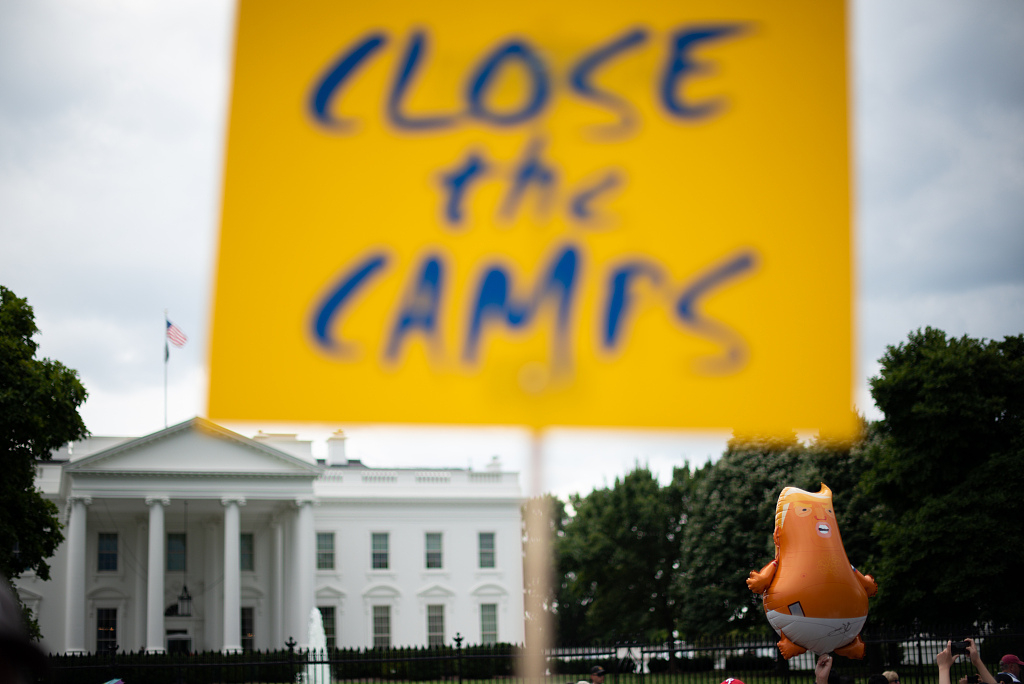
A man wearing a Donald Trump hat and shirt, Lexington, U.S., November 4, 2019. /VCG Photo
A man wearing a Donald Trump hat and shirt, Lexington, U.S., November 4, 2019. /VCG Photo
Editor's note: Mike Cormack is a writer, editor and reviewer mostly focusing on China, where he lived 2007-2014. He edited Agenda Beijing and is a regular book reviewer for South China Morning Post. The article reflects the author's opinions, and not necessarily the views of CGTN.
Three recent events have shown Trump's popularity may be rather less than he thinks. While it is no surprise that the popularity of politicians may ebb and flow, what unusual is the degree to which Trump has insulated himself from the general public while focusing on his core electorate through his rallies, and how this disregard for the majority is now turning against him.
First, he gave a speech at Benedict College, a historically African-American college in Columbia, South Carolina. The city's mayor Stephen Benjamin told the media that out of more than 200 invitees to the speech, there were actually only about 10 were students. Benedict College spokeswoman Kymm Hunter told reporters that the students ultimately attended were only seven. Thus the racial politics of Trump giving a speech to African-American students where most of them had to or chose to stay away are unavoidable. In an age where most politicians are afraid of losing any votes, Trump's popularity rating with African-Americans hovers at around 6 percent, which for a demographic that makes up of over 12 percent of the nation is an astonishing figure.
Second, he attended a World Series baseball match in Washington DC and was roundly booed. While Trump did very poorly in the district in the presidential election (gaining just four percent of the vote), this was little worse than previous Republicans: George W. Bush got 8.95 percent and 9.34 percent in 2000 and 2004. But the outright animosity Trump encountered was something unprecedented. An American president is usually to some degree above politics, as the head of state and thus the personification of the state and the nation. But Trump – as anyone who follows his Twitter account will know – loves the fight.
Third, on last Saturday Trump attended an Ultimate Fighting Championship (UFC) event and was both booed and cheered. To some extent Trump might have expected a UFC match to be home territory. He had previously appeared at wrestling events, even taking part in some matches. The booing, while met with cheers, suggests that the verbal opposition greeting Trump at any event is becoming habitual, feeding off of itself and becoming part of the culture.

Protesters in front of the White House, Washington DC, U.S., July 4, 2019. /VCG Photo
Protesters in front of the White House, Washington DC, U.S., July 4, 2019. /VCG Photo
So why are they worth noting?
A politician's strength comes from a number of sources. They can dominate their party, the media, the public, parliament or congress or whatever representative bodies, or the government and bureaucracy. A Western prime minister or president must control as many of those bases as possible so that their will runs through the section of society. As usual, however, Donald Trump is a counterexample. His appeal is narrow rather than broad. His popularity rating is low as a U.S. president, even in these polarized times. He is widely despised in the media, outside the right-wing ecosystem like Fox News and talk radio.
Though many Republicans in the House and Senate go under his banner, there's a wide suspicion that a good proportion are just waiting for the moment to turn against him; only the protection of Senate leader Mitch McConnell prevents him from even greater political troubles than those in which he currently finds himself. He has no legislative successes to his name, and is widely reported to be enormously temperamental in his decision making.
What does seem to sustain Trump, both personally and politically, are his rallies. These are not political gatherings as previously seen, where political messaging and images were both critical. His approach is like a stadium rock performer, seeking to feed off crowd fervor rather than to persuade or promote political causes. The passionate support of this minority has been enough to sustain his presidency. But the jeers now greeting him are something new.
At times of disaster or tumult, the nation looks to them to unify, comfort and explain. Trump however has shown no interest in the role of unifier. Partly this is temperamental: he has no interest in people outside his immediate circle, except insofar as they serve his desires. But it is also partly ideological. Trump wants always to divide, and to attack, to give the impression of being on the front-foot, if nothing else. His Twitter abuse of Democratic leaders in Congress is remarkable, considering that a president must, in theory, work with them to pursue his or her legislative goals. But Trump has no interest in legislation.
Trump cannot hide from the public forever. As he has actively refused to be a unifier, so Americans are responding in kind. He cannot in all fairness take exception to this – though, of course, his ego will care. But as the applause dies and the jeers take over, any politician should keep in mind how the crowd can become vicious. As boos and jeers mount, does he ever hear the faintest echo of the public?
(If you want to contribute and have specific expertise, please contact us at opinions@cgtn.com)